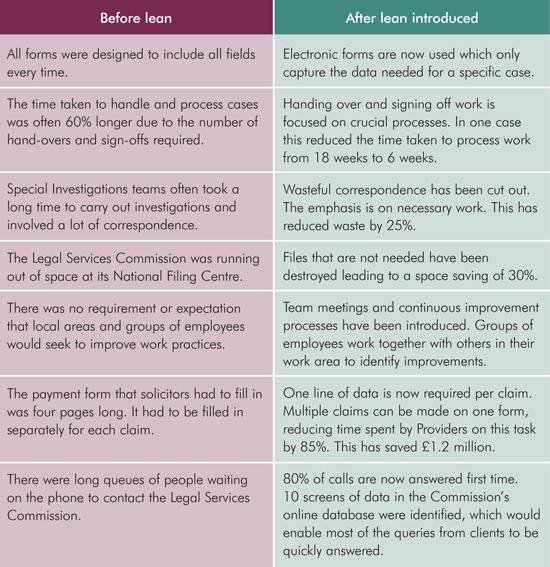
The Legal Services Commission is a service organisation. It provides legal services through its Providers in the form of advice and legal help to a large number of people on low incomes. The Commission runs the legal aid scheme in England and Wales. Legal aid is a system of government funding to enable people who would otherwise not be able to afford legal services to obtain those services.
The Commission receives abudget of £2 billion a year from the government. It is able to help around two million people access legal aid. The government provides funding for legal aid to help people:
- protect their basic rights and get a fair hearing
- access the court process to sort out disputes, for example, with landlords
- address problems that contribute to social exclusion.
With its budget the Legal Services Commission is able to fund solicitors and not-for-profit advice agencies to:
- advise people on their legal problems (such as family breakdown and debt)
- help people understand their rights and the law
- advise people detained in police stations
- if necessary, represent people in court.

The Commission is part of the Ministry of Justice ‘family’ and works alongside partner agencies. Currently it is engaged in a process of reform which has been going on since 2008 to provide a better service. Its aims include:
- ‘to improve the service we provide to customers
- to improve our productivity through better processes and performance management
- to “live within our means” in a challenging financial climate
- to create a culture of continuous improvement where we are striving to deliver the best service possible for the best value for money to the taxpayer .’
This case study shows how the process of reform, using lean production principles, is helping the Legal Services Commission to cut down on any wasteful expenditure.
By introducing improved information systems and processes, it is able to simplify and cut back on wasteful activities and work more efficiently.
Lean production

Lean production is an approach that aims to maximise the use of available resources, thereby reducing waste and inefficiency. Typical components of lean production include ‘Just in Time’ and Total Quality Management (TQM).
Just-in-time is a model applied to production processes of all types. It aims to reduce the costs of holding excessive stocks and avoid duplicating effort. In a manufacturing environment this would refer to holding large amounts of components or finished goods. However in a service organisation like the Commission, just-in-time could help it, for example, to move from holding paper records to providing online data as and when needed.
The Total Quality Management approach is also very relevant to the work of the Commission. TQM involves establishing a culture of quality throughout the organisation. This means that every employee is responsible for making sure the needs of customers are met.

The Legal Services Commission aims to provide the best possible service for its clients. Any activity that creates benefits to these customers is a ‘value adding activity’. By cutting out ‘non-value adding activities’, more time and resources can be spent on providing the best service. This is illustrated in the process of providing legal aid to clients who need legal advice.
The Legal Services Commission uses lean methods which focus on cutting out waste in the way that it operates. It is concentrating on improving the services that people would willingly pay for and reducing wasteful administrative burdens on employees and providers of services to the Commission. For example, its forms have been redesigned to make them easier for clients to complete correctly first time. This has reduced employees’ time spent putting them right. Legal Providers can now supply information electronically or via the internet rather than by post, reducing paper handling and time taken.

With legal aid it is very important that processes are handled quickly and efficiently. There are three parties involved in the process:

Information provided for the Legal Services Commission needs to be in a format that is easy to enter into its computer databases. Providers deal with a range of different types of clients and cases for example, criminal cases where a law has been broken and civil cases involving a dispute between two parties but where no law is broken.
The best way of understanding how lean production works at the Legal Services Commission is to look at some examples:
The benefits of a lean service

Lean production means all three parties involved in the Commission’s processes benefit. Customers get a much quicker and personalised service. Providers work with a simpler and more sensible system. The Legal Services Commission is able to provide a more cost-effective and less wasteful service because less time and expense is taken up on unnecessary activities. This is important as the Legal Services Commission has a fixed budget.
The key benefits to the Legal Services Commission of lean working are to be able to:
- remove waste and duplication
- focus on standard and simple processes to meet clients” needs
- concentrate on improving productivity, speed of meeting customer needs and quality of service
- motivate and involve staff by encouraging them to take ownership for improvement.
As a result the Legal Services Commission is able to focus on value-adding activities. Lean working methods enable the Commission to communicate to staff ways in which performance can be improved.
Everyone can therefore become involved in performance management. A new culture of continuous improvement (CI) and performance management now exists within the Legal Services Commission.

An important part of redesigning the way in which the Legal Services Commission works has been to identify groups of Providers with similar needs. Processes have then been designed with these groups in mind.
Providers are able to benefit from:
- simplified bill processing
- being given more power
- interacting with the Legal Services Commission electronically.
The resulting saving will be such that by 2011 the Legal Services Commission will have cut its administrative budget by up to £30 million (about a third).
Carrying out business electronically will mean that its employees are able to use their time more efficiently and release time for other activities.
Implementing a lean environment

The starting point for developing a lean approach is to research and analyse what customers requirements are in order to identify the best ways of providing value.
The Commission’s market research mainly involved collecting primary data directly from Providers. Focus group discussions were held with Providers in which they discussed ways in which the system could be improved. In addition, questionnaires and surveys were analysed, for example, to identify complaints about weaknesses in the previous system.
Initially implementation of a lean service involved creating aims to work towards. These included improving customer service, improving productivity, using financial resources better (that is, ‘living within your means’) and creating a culture of improvement. A range of lean approaches were then identified and adopted.
By creating an effective system the Legal Services Commission will be able to make savings in space and time and reduce errors. The Commission needs its Providers to be lean too. The Legal Services Commission works with them to identify ways of improving processes through Provider workshops. The Commission trials new ideas with groups of Providers and uses these to make improvements.
The Legal Services Commission also works with partners in the Ministry of Justice family to make improvements, for example, working with the Courts to create simple, easy-to-use forms such as those for means testing. Means testing is a way of assessing how much a client is able to pay based on their income.

There are three strands required to implement an efficient lean system. Examples of new lean initiatives include:
- creating a model office to trial new procedures before launching them across the organisation
- training all staff in how to cut out the main types of waste activity.
Quality Assurance and Continuous Improvement

Quality Assurance (QA) involves confirming that a service meets all requirements when measured against the purpose of and targets for providing that service.
For example, those seeking legal advice should feel that they have received the advice they expected in a timely way. Advice Centres and Solicitors working with the Legal Services Commission should feel that they have been treated appropriately by the Commission, receiving communications and payment on time using straightforward paperwork. Through QA the Legal Services Commission is able to provide better value for money to the taxpayer and service to the customer.

QA firstly requires that appropriate measures and standards are documented for all processes so that the whole organisation understands what is expected. By auditing against these standards, the Legal Services Commission can assess that it is meeting its own and customer expectations.
Continuous Improvement involves everyone. Employees at the Legal Services Commission can propose ideas through an ongoing suggestion scheme. These are then analysed by senior managers. Throughout the organisation groups of employees come together to discuss improvements to their working practices. The emphasis is on getting work done to the standard required first time, every time, with no waste the aim of Total Quality Management. This reduces time, achieves cost savings and improves productivity.
Through sharing ideas, new ways of working have been established. This creates greater consistency and higher quality. Everyone knows how to do the key tasks to a high standard. Improvements have been facilitated by the development of electronic support, for example, in the creation of simple, well explained e-forms (electronic forms) that make working life simpler.
Conclusion

The Legal Services Commission exists to provide support services such as Legal Aid to enable everyone to get appropriate legal advice and support when they need it. Its emphasis is on providing that support as efficiently as possible, in order to meet customer needs in the most efficient and effective way.
Using lean production principles enables the Legal Services Commission to review its practices to ensure it is using public funding in a way that gives the best value for money.
